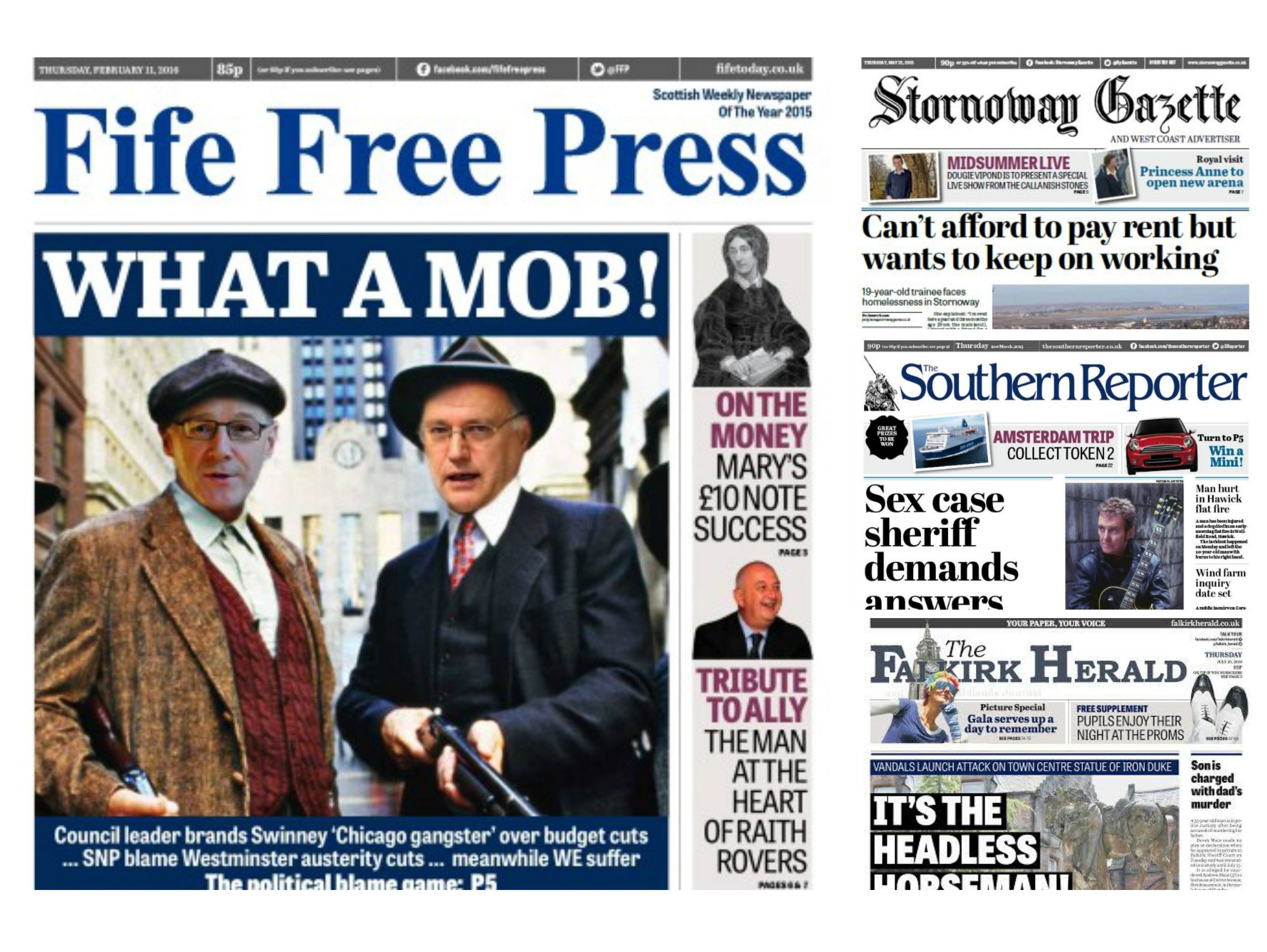
Johnston Press has said loss of advertising revenue to the likes of Google and Facebook is behind its decision to carry out an extensive restructure of its Scottish weekly titles, with the loss of 25 full-time equivalent jobs.
The UK’s second-biggest regional publisher said the “easy option” would be to close titles which are not profitable now, but that it was “acutely aware” of the effect that would have on employees and local communities who rely on them as “their only source of trusted news”.
Johnston Press publishes nearly 40 titles in Scotland, according to its website, but the company said it will now target resources only at those titles “which continue to make a larger contribution to the company’s revenues”.
These have been identified as The Falkirk Herald, Southern Reporter, Fife Free Press and, “to a lesser extent”, the Stornoway Gazette.
Under the restructure plans, those newspapers designated as “small titles” will continue to operate within an “advanced content hub” overseen by the editorial director and led by a new “head of advanced content” role with a stable of reporters, apprentices, “curators” and assistants producing content (and also filing for “priority titles”).
The restructure plans will bring about “a significant reduction in the number of editorial roles,” said Johnston Press.
In an information pack to staff, seen by Press Gazette, the publisher said: “As you will be aware, the media industry continues to face challenges as our audiences migrate to our digital products, which yield lower revenues than our newspapers did in the past .
“The structural changes we have seen have been compounded by the likes of Google and Facebook who are targeting our ad revenues, forcing us to constantly respond to those challenges.
“The latest Enders Analysis (the industry commentator) predicts that in the next two years SME spend on these platforms will equal their newspaper spend.
“With all these choices at their disposal, our communities are not supporting many of our titles in the numbers we need them to and this has led to several of them no longer returning profits.”
It added: “For these reasons, we see the best way forward is to introduce a new structure which will allow us to continue to publish all our titles in the most efficient way and ensure our smallest titles remain viable while at the same time targeting our resource at those titles which continue to make a larger contribution to the company’s revenues…”
In tandem with the restructure, Johnston Press is also set to increase cover prices and, “where appropriate”, reduce newspaper paginations.
“These are difficult but necessary measures to preserve the future of these titles and we explained this to readers when we introduced the recent cover price rise,” it said.
While some posts are lost, others are set to be created as part of the new model.
Anyone who opts to leave the company as part of the restructuring process will be paid two weeks pay at basic salary, multiplied by their years of employment at Johnston Press, up to a maximum of 20 years (or 40 weeks pay).
The Scotsman publisher said it is working with the National Union of Journalists “to ensure these essential changes work for the future of all titles”.
It added: “We realise that this is a difficult message for staff who will need to make decisions about their own future while coming to terms with the fact that the titles they have been a part of for many years can no longer be managed in the way they once were.”
Briefings with staff are taking place from today until Thursday.
Jeremy Clifford, Johnston Press editor-in-chief, said: “The planned restructure is designed so that we can continue publishing our community titles for as long as possible, against the backdrop of the challenging commercial pressures we face.
“We appreciate sometimes we have to take difficult decisions but they are in the best interests as we work towards maintaining these important, trusted local newspapers.”
Paul Holleran, NUJ Scottish organiser, said: “Members were shocked at the scale of proposed job losses and are now aware of the long term precarious position of 24 Johnston Press Scottish titles.
“So far the management team have worked closely with the union in providing relevant information, maximising consultation and responding positively to initial negotiations. We have been told that their plans will put these titles into profitability.
“From our point of view we want to save all the titles, protect the journalists who will continue to work on these papers and get the best possible deal for those members who choose to leave the business.
“They have agreed a sensible timeframe for consultation and negotiation and I am hopeful agreement can be reached as soon as is practicable.”
The NUJ in Scotland has approximately 98 per cent membership in Johnston Press and a strong NUJ group chapel representing members from Stornoway to Selkirk.
Picture: Johnston Press
Email pged@pressgazette.co.uk to point out mistakes, provide story tips or send in a letter for publication on our "Letters Page" blog
